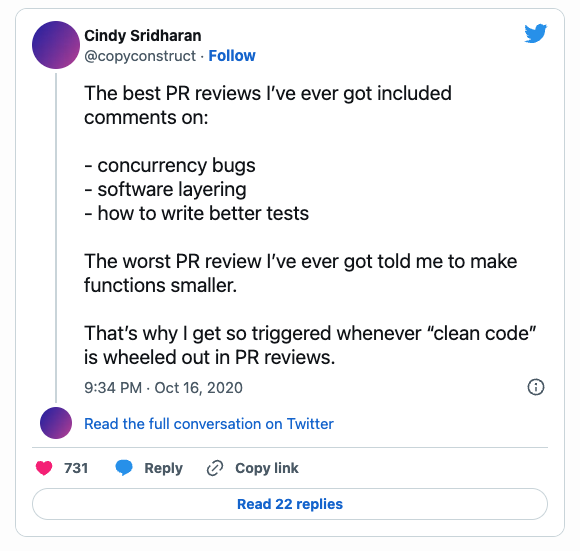Reviewing Code
The most important advice I’ve ever read about reviewing code …

Reading
- Thoughtful code reviews: as practiced at Gitlab
- Conventional comments: is an idea I like a lot. Make your intent obvious when you say something about code and include as much context as you can
- eg suggestion (security): I think there may be an issue here …
Code reviews are a most excellent opportunity to share experience about a program or the way a team thinks about work! The goal is to share context, and potentially relevant personal experience with the author about a problem / solution, and to spot things that could bite you. Nitpicking is not helpful!
The Review
- Does it work? 😆
- Show me the tests! Seeing tests brings me joy! 🥰
- Is it easy to understand and written simply? Avoid the clever. Readability is super important. This can’t be overstated
- Focus on the interesting bits. Eg:
- Concurrency
- New libraries / dependencies
- What’s the license? LGPL and Apache licenses are acceptible (Others could be onerous and should be scrutinized. Avoid copyleft …)
- Error handling (See below)
- Remote calls
- What if your dependency isn’t available or slow to respond? Have we thought about the failure case? (Timeouts [both connection, read], circuit breaker)
- Retries if it makes sense (idempotent action), and backoff
- Db usage
- Can we be caching here
- Do we have / need an index for this? Is the new feature on a hot code path?
Error Handling
- Are exceptions being captured and an error report being created for issues we can do something about?
- Yes – bad configuration in a client, or module leading to failure
- No – bad user input (eg Somebody entered a birthdate in a form not in the right format causing our input validation layer to fail)
- Otherwise log (Or maybe log in addition to?)
- Handle specific exceptions you know may be thrown, and include a generic handler for everything else
- Propagate errors out to the places where they can be handled
On database changes (queries, migrations)
- What table is it?
- Know your big tables (eg mongodb has a command called stats on db.collection objects
db.table.stats()) - We mostly care about big tables (for some definition of big)
- Know your big tables (eg mongodb has a command called stats on db.collection objects
- Show us the explain plan
- What does the query planner estimate is the most selective access path? (Determine against prod shaped,sized data without actually running the query in prod!)
- Table scans probably don’t matter for tiny tables that will fit completely in memory
- What index is it using?
- db.getIndexes()
- Look at query doc
- How selective is that index?
- How many records to you expect to return?
- How hard is it expected to hit the disk?
- If you’re changing an existing query, will the preferred index by the optimizer change
My favourite code review links
- Testing in the Twenties with Tim Bray
- One Shopify engineer’s list
- Google Code Review Guidelines
- Here’s something from the point of view of the code author (On bringing reviewers joy …)
- Conventional Comments: How to comment with a bit more context about whether you think something is a blocker or suggestion.


